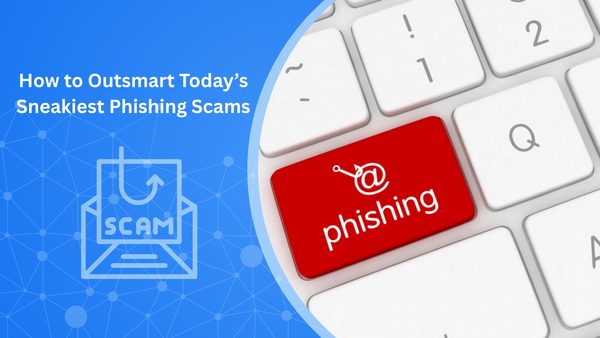Don’t Get Pwned This Cybersecurity Awareness Month: A Gamer’s Guide to Staying Scam- and Malware-Free

During Cybersecurity Awareness Month, it’s worth remembering that scammers and hackers never leave any stone unturned — and their targets include the gaming community.
Whether you’re a casual gamer who plays a few rounds after work or an avid player who lives for tournaments and mods, cybersecurity should be part of your loadout.
Threat actors are constantly setting traps in areas where gamers dwell.
From Steam and Discord to YouTube, Twitch, and other social media platforms, they impersonate developers, host fake giveaways, promote cracked games, and share malware disguised as mods, patches, or cheats.
Why target gamers? Because it works.
Players are naturally curious, eager to test new releases, and quick to chase “exclusive” content or free bonuses. For cybercriminals, gamers are a gold mine — full of valuable Steam accounts, digital currencies, saved payment info, and personal data.
Cracked Games and Shady YouTube Downloads
If you’ve ever searched for “cracked” or “modded” versions of popular games, you’ve probably stumbled upon YouTube videos promising “free premium downloads” with a password-protected .rar file hosted on platforms like MediaFire.
These might look innocent, but they’re among the oldest — and most effective — malware traps.
Cybercriminals use password-protected archives to stop automatic antivirus scans on upload sites. Once the file is downloaded and extracted, it’s game over: the malware executes silently, often stealing credentials, cookies, or system data in the background.
A growing number of YouTube channels are now promoting malicious “mods,” “hacks,” or “executors” for popular titles like Roblox, Valorant, CS2, and GTA V.
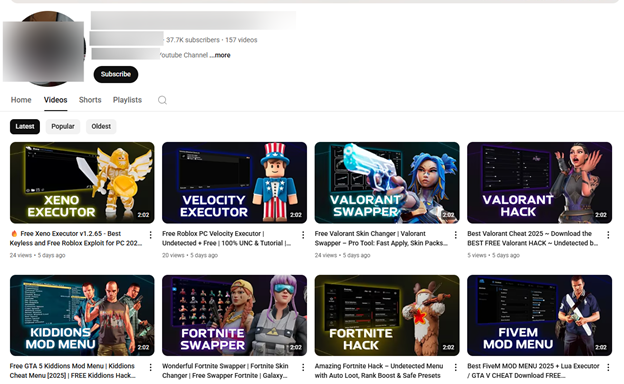
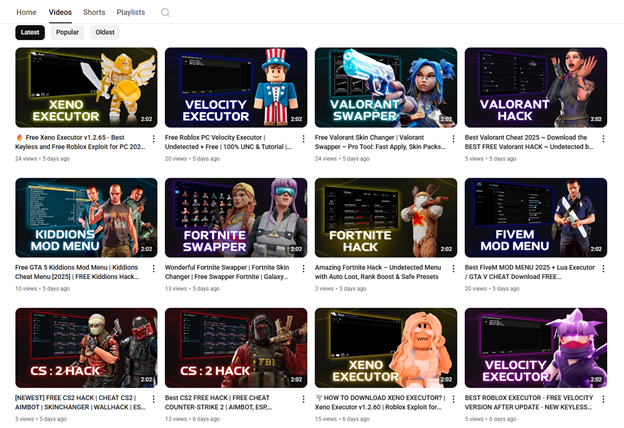
At a glance, these videos seem legitimate. They show tutorials, feature gameplay footage, and link to archives for “download.” But the danger runs deep, since many of these channels appear to have been stolen and repurposed by threat actors.
In several cases, the original videos remain visible and completely unrelated to the malicious content, revealing the account’s previous identity. One channel with over 37,000 subscribers from Indonesia shows clear signs of compromise. Beginning October 1, it began promoting supposed “cheats” and “free executors,” exposing a sizable audience to malware-laden files disguised as gaming tools.
This trend highlights a worrying shift: cybercriminals are no longer creating new accounts to spread their campaigns. Instead, they’re hijacking established YouTube and social media accounts — often with large followings — to instantly boost credibility and reach.
Recent Case Study: The Fake “Minecraft Vape V4 Crack” Download
Bitdefender researcher Ionuț Baltariu recently stumbled upon a YouTube video titled “New Vape V4 Crack Version | Minecraft Vape V4 Cracked Free Download.” The video description contained a MediaFire link that lead to password-protected archive named Launcher.rar.
Inside the file? A malicious executable called Launcher.exe.
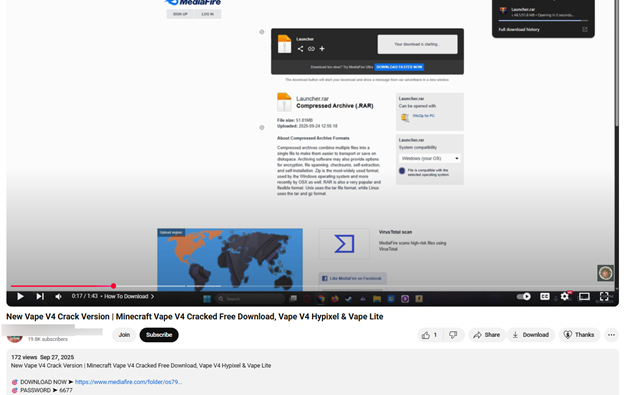
What’s Really Inside the File
Bitdefender researchers discovered that Launcher.exe hides a Node.js-based script that performs advanced system operations — including data theft, remote access, and antivirus tampering.
Here’s a breakdown of what it does:
- System reconnaissance: It collects Windows version, architecture, and antivirus information.
- Privilege escalation: It relaunches itself with admin rights if possible.
- Antivirus evasion: It uses PowerShell commands to disable Windows Defender scanning for folders like C:\Users, C:\ProgramData, and %TEMP%.
- Remote communication: It sends stolen system and security data to servers such as digitalservice365cloud.com and mceenzie.sbs.
- Payload delivery: It downloads and executes additional malware, keeping the infection alive and evolving.
Even more cunningly, the malware uses anti-analysis techniques — if it detects that it’s being tested in a sandbox or virtual machine, it terminates itself and launches a fake calculator app to fool security researchers.
We’d love to thank Bitdefender researchers: Denisa Alexandra Iacob, George Constantin Simion și Răzvan Ionuț Mihai for their help in analyzing the malicious payload.
How Hackers Take Over YouTube and Social Media Accounts
Most of these malicious uploads originate from hijacked content creator accounts. Attackers use phishing emails, fake sponsorships, or InfoStealer malware to steal credentials, cookies, and session tokens. Once inside, they can bypass two-factor authentication, rename the channel, replace the profile image and description, and post malicious tutorials or fake download links that appear trustworthy because they come from an existing, verified account.
Gamer’s Checklist: How to Spot a Suspicious Video or Offer Linked to a Potentially Compromised Account
Before clicking “Download,” pause for a moment to investigate the claims. Here’s a quick checklist to help spot red flags:
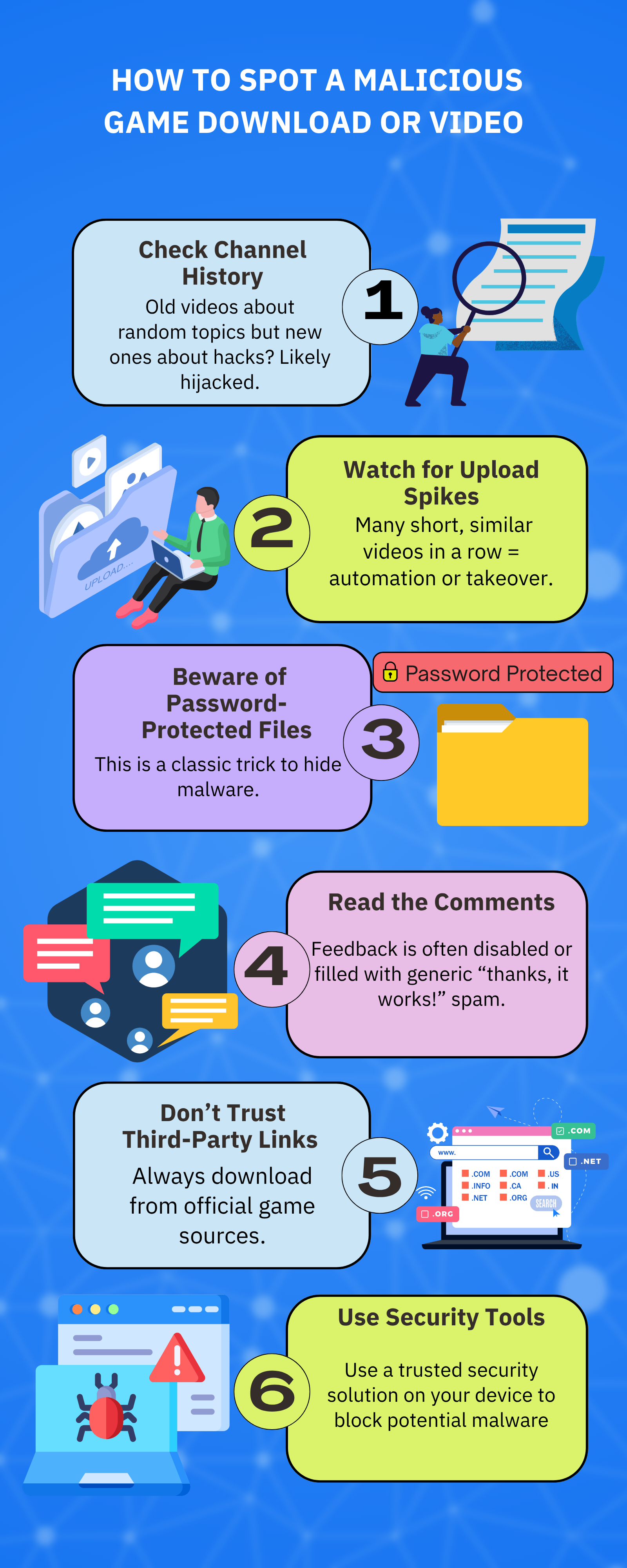
Bitdefender Security for Content Creators offers specialized protection for creators who depend on platforms like Facebook, Instagram, and YouTube. It safeguards accounts against takeover attempts, phishing campaigns, and malware targeting content monetization.
Malicious Steam Games: The PirateFi and BlockBlasters Incidents
Even reputable platforms like Steam aren’t immune from being exploited by hackers. Recent incidents involving PirateFi and BlockBlasters showed how less popular games can suddenly be updated to include malicious code.
It’s a subtle yet effective cybercriminal tactic that can have devastating consequences for players. Once a compromised game gets updated, the malware installs silently without raising suspicion via Steam’s automatic updates.
To stay safe, avoid games that:
- Have no verified developer or community presence.
- Show suspiciously low engagement or fake-looking reviews.
- Require manual “patches” or external downloads to function.
Fake Giveaways and Counter-Strike 2 Scams
Bitdefender has also uncovered stream-jacking campaigns and fake giveaways targeting Counter-Strike 2 fans during eSports events.
Scammers posed as sponsors or tournament partners, inviting players to claim exclusive skins or beta access. The links and QR codes embedded in videos led unsuspecting users to phishing pages designed to steal Steam or Discord credentials.
These scams spread quickly across YouTube, Twitch, and Discord, using social engineering to prompt users to act fast and think less. Once credentials are entered, attackers can drain inventories or resell accounts in minutes.
Steam Phishing Scams: The Trade Request Trap
Ah, the good old days of Dota 2 on Steam — playing with friends, getting post-match drops, or buying The International Compendium to collect exclusive rewards. Back then, the trading system was a huge part of the fun: swapping rare items, comparing inventories, or sending trade requests to teammates.
But alongside all that excitement came something less fun — scammers. While this tactic might be an oldie, it’s still one of the most effective tricks on Steam today. The trade-based phishing scam has evolved over time, becoming more convincing and dangerous.
Here’s how it works in 2025:
- You put an item up for sale or trade.
- A random user adds you as a friend, pretending to be interested.
- They offer a trade and send you a “verification link.”
- The link leads to a cloned Steam partner site that looks absolutely legitimate — even with the official logo and SSL padlock.
- As soon as you log in, your credentials and two-factor authentication codes are stolen.
Some modern variants even use browser-in-the-browser attacks, where fake login pop-ups perfectly mimic Steam’s real interface — a technique that fools even experienced gamers.
Scam: Selling Steam Accounts Loaded with Games
Not all threats come from hacks or malware. A newer scam involves selling access to Steam accounts that already have all the big titles installed. The catch? You don’t own the account – you’re just borrowing it. Until the scammer revokes access, of course.
People may see this scam via ads on Facebook, Discord groups, or other social channels, promising “lifetime access” for a few dollars. Some even encourage you to log in before paying, as “proof” the account works. Once enough people have paid, the scammer locks the account, changes credentials, or disappears. (Bitdefender Labs report)
Even worse, many of these accounts were bought initially using stolen credit cards. When Valve or Steam detects potential fraud, they disable the account, meaning both the scam victim and the original owner lose access.
If you want to read more on Bitdefender’s Research on Gaming Threats, here’s a short article recap that includes everything from Facebook ads promoting fake Beta invites to Llluma Stealer campaigns targeting League of Legends fans:
- Gamers Beware: There’s No Such Thing as ‘GTA VI Beta Version’ to Download from Sponsored Facebook Ads. It’s Malware!
- Lumma Stealer Campaign Targets League of Legends World Championship Fans Through Social Media Ads
- Facebook Ad Scam Targets Gamers with Fake Witcher 4 Beta Invite to Steal Steam Accounts
- Scam Alert: Fake Battlefield 6 Beta Ads Are Stealing Steam Credentials
- Unmasking the SYS01 Infostealer Threat: Bitdefender Labs Tracks Global Malvertising Campaign Targeting Meta Business Pages
How to Stay Safe While Gaming
Here’s a cybersecurity checklist to review before pressing “Play”:
- Download only from official sources. Stick to Steam, Epic Games Store, or official developer websites.
- Avoid password-protected archives. They’re often used to hide malware.
- Ignore “too good to be true” offers. Free skins, beta keys, and cracked tools are prime bait.
- Use strong security software. Protect your PC and mobile devices with Bitdefender Premium Security
- Check links before clicking. Scan suspicious URLs with Bitdefender Link Checker.
- Double-check any suspicious messages or giveaways. If in doubt, ask Bitdefender Scamio, our free AI scam detector, to verify them for you. You can access Scamio via WhatsApp or even Discord. So it’s just a click away and available 24/7 to check for potentials scam links, messages and even QR codes.
This Cybersecurity Awareness Month, make sure you level up your online security by choosing Bitdefender’s award-winning protection.
Enjoy the perks of customizable profiles designed to reduce system workload and eliminate slowdowns for an uninterrupted, smarter gaming experience. You can now benefit from our special seasonal offers, available here.
tags
Author
Alina is a history buff passionate about cybersecurity and anything sci-fi, advocating Bitdefender technologies and solutions. She spends most of her time between her two feline friends and traveling.
View all postsRight now Top posts
How Do You Manage Your Passwords? We Ask Netizens
December 18, 2025
Cybercriminals Use Fake Leonardo DiCaprio Film Torrent to Spread Agent Tesla Malware
December 11, 2025
FOLLOW US ON SOCIAL MEDIA
You might also like
Bookmarks






